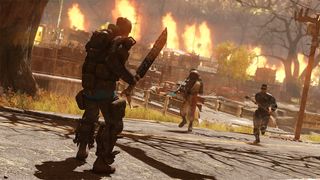Fallout 76 battle royale stands out by retaining so much Fallout DNA
Bethesda streamlined their RPG but didn't tear it to pieces just to make it fit battle royale. The result: a very Fallout-y BR mode.
I don't know quite what I expected from battle royale in Fallout 76, but I assumed Bethesda would strip out most of Fallout 76's features and just have everyone scrounge for gear and shoot each other while a circle closed around them. In other words, a battle royale that looked like Fallout but didn't feel much like it. But Bethesda really leaned into its existing game design rather than ripping it apart in order to fit a standard battle royale mold.
As a result, Fallout 76 battle royale feels very different from other BR games out there, which is exactly what battle royale games need to do to stand out in an overstuffed genre.
And it's not just novel. It's also a lot of fun.
52 players (in teams of 4) pick their spawn points from a small-ish map. You've got a few seconds of invisibility to scamper somewhere safe if you've spawned in the same spot as enemy teams, which happens pretty often due to the size of the map and relatively few tempting starting locations. Then you scrounge for guns and gear as a circle of fire slowly shrinks around you.
As standard as that sounds, it's still packed with Fallout stuff. You find locked safes to pick with bobby pins and computer terminal passwords to hack to access loot or show enemy positions on the map. There are new perk cards, and you open new card packs after matches. There's PvE against a few of the creatures we know from Fallout 76. There's VATS (though only against the wildlife, not against other players). You can even bring your camp from the base game and plop it onto the map, and find turrets and other defensive structures to set up a quick camp if you need one.

It's all been reworked and streamlined to keep a brisk pace in matches, but Fallout 76's core hasn't been entirely sacrificed to the BR gods, either. There aren't armor parts, for instance: You pick up entire suits of armor all at once (including power armor). Weapons and chems are automatically added to your radial wheel which means you don't have to spend too much time mucking with your inventory.
Another cool thing is the ring of fire closing around the map: It isn't just dangerous to you, but to the environment as well. I was hustling along a road with the fire at my heels, and ran past some of those wrecked atomic cars you see scattered everywhere. A moment later the flames engulfed the vehicles, and ka-boom. They all exploded and I took a big hit to my health. The ring isn't just a dotted line that drains your HP if you're on the wrong side of it, it can really fuck you up in other ways.
The biggest gaming news, reviews and hardware deals
Keep up to date with the most important stories and the best deals, as picked by the PC Gamer team.
Even the pre-match lobby—a feature of BR I've truly come to loathe because it's just a bunch of waiting around while idiots punch you in the face*—is a great thing in Nuclear Winter. The lobby is Vault 51, a new location, and there are terminal entries to read, soccer balls to kick, instruments to play, and lore to discover. Lore! In the damn lobby!
For once I find myself wishing the matches didn't start so quickly. As you play more battle royale matches you gain Overseer levels and can (eventually) access restricted areas in Vault 51 and learn more about its origins and purpose.
*Note: Idiots will still punch you in the face in the lobby. But not as many as usual!

On the downside, Fallout 76 battle royale only has teams of four, no solo mode—though you don't have to stick with your team or even spawn with them. Just know that if you go it alone you're going to run into other packs of four teammates, so you'll pretty much always be outnumbered.
Fallout 76's battle royale is surprisingly good fun. Don't take my word for it: you can play it yourself for the next week, even if you never bought Fallout 76. It's free until June 17, as is the rest of Fallout 76.

Chris started playing PC games in the 1980s, started writing about them in the early 2000s, and (finally) started getting paid to write about them in the late 2000s. Following a few years as a regular freelancer, PC Gamer hired him in 2014, probably so he'd stop emailing them asking for more work. Chris has a love-hate relationship with survival games and an unhealthy fascination with the inner lives of NPCs. He's also a fan of offbeat simulation games, mods, and ignoring storylines in RPGs so he can make up his own.
Most Popular


